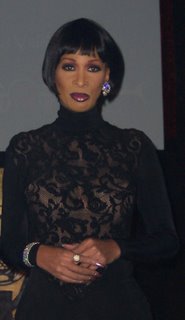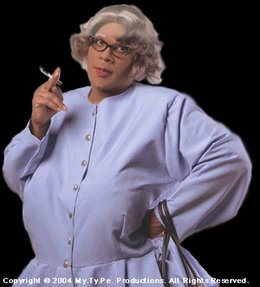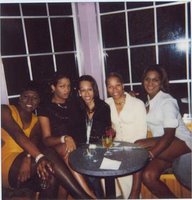 TransGriot Note: This is the text of the speech I delivered to the IFGE Conference in Philadelphia, PA on April 7, 2006
TransGriot Note: This is the text of the speech I delivered to the IFGE Conference in Philadelphia, PA on April 7, 2006 Giving honor to God, the leadership of IFGE, friends and family. I am humbled to be standing before you today as a representative of Transsistahs-Transbrothas, the Lone Star State, the Bluegrass State, and my hometown of Houston to officially become the third African-American transperson to be awarded a Trinity.
This day is one that I thought that I’d never see because of my outspokenness about a myriad of issues in the transgender community. But like my mentors, Phyllis Frye and Sarah DePalma and one of my leadership role models the Rev. Dr. Martin Luther King, I have not hesitated to call people and organizations out when I felt that they could and should do better to uphold the legacy of the Civil Rights Movement. The Transgender Rights Movement is the next evolution in the ongoing struggle for human rights and we need to take that seriously.

It’s been an interesting road that I’ve traveled to get to this point in my life and ironically I have IFGE to thank for giving me the impetus for jump starting my activist career. At the beginning of my transition in 1994 I started a subscription to Tapestry. (hold up the magazines) Inside these two issues were the Out, Proud and Trans series that pissed me off to the point that I made it my mission to attend my first GenderPAC Lobby days in 1998, a subsequent one in 1999 and become a leader in the transgender community.

What was it about these two issues that made me angry? Well, the problem for transgender people of color has always been visibility. Ever since Christine Jorgensen stepped off that flight from Denmark onto the tarmac at JFK airport in 1953 the lion’s share of the coverage of GLBT people has been of people that looked like you and her.
Out of the 50 people that these two issues honored for being ‘Out and Proud’, the two they found to represent me were RuPaul and Dennis Rodman. Neither are transgender people like the other two African-American Trinity winners who preceded me at this podium, Dawn Wilson and Dr. Marisa Richmond. RuPaul and Dennis Rodman both stated publicly that they didn’t want to be.
So why hold them up as representatives of my community?
The other problem is that it unintentionally reinforced a stereotype that the only thing that my people can do, can become or be recognized for is being an entertainer or an athlete.
Why is this important? For a transkid of Euro-American descent they get to see role models that are lawyers, doctors, airline pilots, police officers, et cetera that cancel out the negative Jerry Springer images. A transkid that shares my ethnic heritage doesn’t have that balance and that concerns us. A reasonably intelligent college bound African-American transkid is left to wonder after seeing that contrast, “Where are the people who look like me?” “If I transition is this what my life is going to be like?’ “Do professional African-American transpeople exist?”
In my era my first exposure to transgender people that looked like me besides the 1977
Jefferson’s episode was either through attending drag shows or seeing transgender sex workers plying their trade. The ones that did pass were hiding in deep stealth mode. I didn’t meet another out professional African-American transperson like myself until 1999.

Lack of media coverage hurts. I can only name two African-American transpeople that I read articles about when I was growing up and both were surprisingly published in one of the journalistic Bibles of Black America, Jet Magazine.
Justina Williams had one written about her transition and her struggles with General Motors in 1979. It’s also interesting to note that in this article the author used the proper pronouns to describe Justina 20 years before the AP changed their stylebooks. Almost a decade later, in 1987 an article appeared about Sharon Davis which chronicled her transition and the book she was writing about it entitled ‘A Finer Specimen of Womanhood’.
When you’re a minority, positive role models, a connection to your history, and faith are vitally important building blocks to the maintenance of one’s pride and self-esteem. That fuels personal achievement that uplifts the entire group. IFGE has played a major role in documenting that history and honoring the people doing their part to build a transgender community and for that I applaud and support their efforts to do so. From this day forward I will be doing my part by not only writing occasional articles for Tapestry but encourage other people of color to do so.

One of the problems that we’ve had in the African-American trans community is that for various reasons we haven’t had a similar ongoing effort to organize it on a national scale until now. The late Stokely Carmichael aka Kwame Toure once stated, “In order to become a part of the greater society, you must first close ranks.”
Basically that is what the African-American transgender community is doing. We’re not doing it to shut you out of the process but turning inward to build the same kind of infrastructure and support systems that you have enjoyed for two decades. We seek to not only build a community that our kids can be proud of but at the same time build and lift ourselves up in order to become a stronger partner for the entire transcommunity. We spent a few days during TSTBC 2005 hammering out a document that we call the African-American Transgender Action Plan or AA-TAP for short. It is a ten-point program rooted in the lessons that our ancestors brought here with them from Africa that will serve as the guiding organizing principles for building our community
TSTBC is a major building block in that effort. Just as the IFGE conference over the last 20 years has served to educate, inform and train our past, present and future leaders and allies the Transsistahs and Transbrothas Conference will do the same. It will also provide a way for you to reach our people that may not be comfortable coming to an
IFGE conference or to
SCC but will show up in Louisville to hang out with their peeps. By the way, the second annual TSTBC is happening October 18-22 once again in Louisville.

So why aren’t African-American transpeople comfortable attending events like this?
It always mystified me when I attended SCC for example why there were almost no peeps like me that were attending this event except the hotel staff and the conference was hosted in the Black gay mecca of Atlanta, GA.
Well, let me tell you a few reasons why. One of them is the cultural difference. African-Americans have always been a spiritual people with a church centered culture. I am a Christian as are many people who are African-American and transgender. I have seen every faith tradition represented and respected at GLBT events except Christianity.

Granted, some people who profess to be Christians have invited this negative response but there’s a major difference between little ‘c’ Christians and big ‘C’ ones. Big ‘C’ Christians believe in love, tolerance, understanding others and their differences and embracing them. Little ‘c' Christians are the intolerant ones who are using the faith as a white sheet to camouflage their bigotry and hatred. Christianity isn’t the private property of right-wing zealots. It’s past time for those of us in the GLBT community who are Christian to proclaim it, stand up to those thugs and take our faith back from the Pharisees who are using it as a baton to beat us down with.
Unfortunately because of the hurt and pain that’s been inflicted on GLBT people by these Bible-thumping posers, some GLBT people have begun denigrating ALL Christians in response to what has been done unto them. Bashing Christians doesn’t play well in my community. In fact one of the things that we were adamant about during the planning for TSTBC 2005 was starting a tradition of having a church service to close it. We also wanted to create an environment where not only Christianity is respected but we strive to respect TSTBC attendees whose faith traditions differ from our own.
Another thing that doesn’t play well in my community is America’s original sin, racism. As I have written, taught and said to anyone who would listen, the transgender community is a microcosm of society at large. The same problems that exist in the parent society also exist in our subset of it.
I have been called the n-word in Euro-American dominated online groups. I have been called an uppity nigger behind my back. I incredulously saw someone post last year on another list that the only reason that TSTBC was being held was because it would make it easier for us to solicit tricks. We have had activists walk into Congressional Black Caucus offices during lobby days and tell legislators that share my ethnic background that African-American transpeople don’t exist.

Yes Virginia, racism does exist in the trans community and we need to put a stop to it post haste before it creates a permanent split between the African-American transgender community and you. That is dangerously close to happening right now.
It also pisses us off when you don’t listen to us or dismiss what we have to say. I have been a minority since I was born at 10:45 PM on May 4, 1962. People of color are equipped with coping skills and mechanisms that we learned growing up that allow us to deal with the daily slights, slings and arrows that come with minority status. We have an uncanny ability to read people or organizations that say one thing and do the opposite since we’ve been historically lied to over the years. So if we tell you not to trust them, listen to us. You’ll save yourself a lot of grief in the future.
And please don’t ever in life use the words ‘you’re just playing the race card’. It infuriates me and other people of color when that term is used to marginalize our very real experiences with bigotry and the racism we deal with in this country by disrespectfully comparing it to a card game.
Since I’ve laid out some things that depress African-American participation in the overall transgender community, It‘s only fair that I offer a few suggestions that will hopefully increase it.

The dots have to be connected in terms of the historical roles that African-American transpeople have played in shaping the transgender community. An African-American transwoman was present at the Stonewall Riots. We helped found GenderPac, NTAC, BGB and the Tennessee Vals in addition to other regional organizations that have uplifted transgender people. Unfortunately we’ve gotten very little recognition for it or have been edited out of the historical records. That needs to stop. If the historical record reflects the fact that we helped found it, then people of color will be more inclined to take ownership of the various groups and participate in them.
We have to have some media face time too. The African-American transgender community has some long term plans to help correct that imbalance. While we’re working on that, the bottom line is that media peeps will call the white transgender community first because you already have the infrastructure in place. When you get that call, make sure that you also let them know that there are people of color that need to be included in this conversation.

Basically that’s how Dawn and I got the notification for the
Courier-Journal article that we’re featured in. Reporter Angie Fenton called Fairness looking for help in finding transgender people who’d be willing to talk on the record and they referred her to us. When transkids of color see peeps in the media that look like them who are living their lives and telling their stories, it’s a win-win for all of us.
Second. Make events affordable and accessible. African-Americans only get 70 cents to every dollar a white person earns. When you have a conference in a hotel in which a room costs $200 dollars a day and you then have to pay conference registration fees on top of that, it creates participation barriers. The fiscal participation barrier leads to a perception that people of color aren’t wanted and that’s how you end up with an event that ends up with 99% white transpeople.
I realize that middle and upper class transgender people support IFGE, other transgender conventions and our organizations. However, this fiscal access problem that shuts out TPOCs also is keeping other T people of color out including the Asian and Latino/a communities. Watching the economics of conventions and keeping hotel prices affordable will grow the community amongst all transgender people, make the convention programming resources accessible to more T people of all income levels and make this community more inclusive in general. It’s a simple formula. Make the events more affordable and eventually all colors of the transgender rainbow will appear.

The accessibility issue is also important. Too many times support group meetings are held in suburban locations with little or no access to public transportation. If your city has a GLBT Community center that is located close to public transportation consider using that as a meeting site. If you’re planning a convention ensure that your host hotel is close to public transportation and that schedules and route maps are widely available to the convention attendees.
Third. If you want us at your events, you’re gonna have to advertise in our media too. There are African-American newspapers in many cities that would love to not only get the advertising dollars but want stories about transgender issues. For example, CLIK magazine is an Atlanta-based GLBT publication that caters to the national African-American community.

I’ll close with the words of the Rev. Dr. Martin Luther King from a November 1956 speech he gave in Montgomery, AL entitled ‘Facing the Challenge of a New Age.’
‘Another thing we must do in speeding up the coming of the new age is to develop intelligent, courageous, and dedicated leadership. This is one of the pressing needs of the hour. In this period of transition and growing social change there is a dire need for leaders who are calm and yet positive. Leaders who avoid the extremes of ‘hot-headedness and ‘Uncle Tomism’. The urgency of the hour calls for leaders of wise judgment and sound integrity-leaders not in love with money, but in love with justice; Leaders not in love with publicity but in love with humanity. Leaders who can subject their particular egos to the greatness of the cause.'
Dr. King continues by paraphrasing an author with the last name of Holland by saying:
God give us leaders!
A time like this demands strong minds, great hearts
True faith and ready hands
Leaders whom the lust of office does not kill
Leaders whom the spoils of life cannot buy
Leaders who possess opinions and a will
Leaders who have honor, leaders who will not lie
Leaders who can stand before a demagogue
And damn his treacherous flatteries without winking!
Tall leaders, sun crowned, who live above the fog
In public duty and private thinking.
I hope and pray that over the last 8 years that I’ve evolved into that type of leader and will continue to do so in the coming years.






























